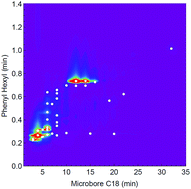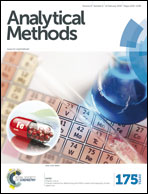Overcoming solvent mismatch limitations in 2D-HPLC with temperature programming of isocratic mobile phases
Abstract
This work describes a method for two-dimensional high performance liquid chromatography (2D-HPLC) that uses an isocratic mobile phase with a temperature gradient in the first dimension. Temperature programming was used to manipulate solvent elution strength in place of a mobile phase concentration gradient. This ensured that all eluent fractions transferred into the second dimension were of an identical solvent composition, i.e. the second dimension injection solvent did not increase during the course of the analysis. When applied to a complex natural product extract of coffee, the separation was completed in 35 min and had an orthogonality of 35% (calculated using the bins method) and a spreading angle of 52° as determined via a geometric approach to factor analysis. This approach, incorporating a temperature gradient in the first dimension, compared favourably to previously reported 2D-HPLC separations of coffee, with similar or shorter analysis times.



 Please wait while we load your content...
Please wait while we load your content...